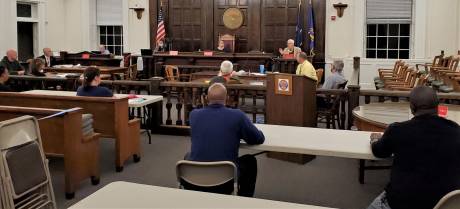
Genesee County leaders are advocating a spirit of togetherness as they take a divide-and-conquer approach to fulfilling the requirements of Gov. Andrew Cuomo’s Executive Order No. 203 on community police reform and reinvention.
On Wednesday night at the Old County Courthouse legislative chambers, the Genesee County Police Reform and Reinvention Collaborative met for the first time, with 15 of the group’s 19 current members attending either in person or via Zoom videoconferencing.
County Legislature Chair Rochelle Stein put out a call for unity and respect as she welcomed those who are tasked to address the policies and procedures of the Genesee County Sheriff’s Office per the Executive Order issued on June 12.
“Together … we have an opportunity to learn from each other … to improve and manage public safety … through thoughtful, respectful and robust discussions,” Stein said. “Step by step by step, we will do this together.”
Stein emphasized that each member of the committee – from public officials to representatives of social or minority groups -- was important to meeting the governor’s directive.
“Each community must envision for itself the appropriate role of the police,” she said, “and policies must be developed to allow the police to do their jobs to protect the public and the policies must be with the local community’s acceptance.”
Following her opening statement, Stein introduced Robert Bausch, former County Legislature chair, who will serve as moderator for the group. After that, the committee members who were social-distanced throughout the room said a few words about themselves.
County Manager Matt Landers then read highlights of the Executive Order, focusing on the section that outlines the 15 different policing strategies that must be analyzed by Sheriff William Sheron and the community stakeholders.
Landers distributed a 10-meeting timeline (on Monday nights at 6:30), with five of those meetings dedicated to reviewing those 15 strategies as follows:
- Nov. 2 – Use of force policies, procedural justice, any studies addressing systemic racial bias or racial justice in policing;
- Nov. 16 -- Implicit bias awareness training, de-escalation training and practices, law enforcement assisted diversion programs;
- Dec. 7 -- Restorative justice practices, community-based outreach and conflict resolution, problem-oriented policing;
- Dec. 21 -- Hot spots policing, focused deterrence, crime prevention through environmental design;
- Jan. 4 -- Violence prevention and reduction interventions; model policies and guidelines promulgated by the New York State Municipal Police Training Council; standards promulgated by the New York State Law Enforcement Accreditation Program.
Sheron is scheduled to give a report on his department to legislators and the committee during a regular meeting of the legislature on Oct. 28, and will answer questions afterward.
Last night, the sheriff pointed out that the Genesee County Sheriff’s Office recently was reaccredited by New York State, which means that the agency has met or exceeded 133 standards as set forth by the state. The department was initially accredited in 2000.
Accreditation aside, Sheron said he would appreciate members' input, adding that "constructive criticism" is a vehicle "to making it better for our citizens."
The remainder of the collaborative’s meeting timeline indicates: a review of the draft report on Jan. 18; presentation of the draft to the public for feedback on Feb. 1; review and vote on the final report on Feb. 15; submission to the county Ways & Means Committee on March 3; adoption by the full county legislature on March 10; and delivery to the state Division of the Budget prior to April 1.
The Executive Order stipulates that the reform plan must be submitted to the state by April 1 or else it could jeopardize the locality’s state aid.
Landers said that the timeline isn’t etched in stone and that he is open to adding to the group’s number, especially if the interested person represents “another perspective or opinion.”
He added that the county’s Information Technology staff will be recording the meetings and the public is invited to attend in person (adhering to COVID-19 guidelines) or via Zoom.
Members present at last night’s meeting -- along with Landers, Stein and Sheron -- were:
- Community members Julie Carasone, Perez Dinkins, Barb Starowitz, Tyrone Woods; Genesee Community College international student Rachel Gelabale;
- Nonprofit community group member Lynda Battaglia, Genesee County Community Mental Health Services;
- Faith-based leader John Keller, Northgate Free Methodist Church;
- Educational group member Rachel Siebert, Genesee Valley BOCES;
- Local elected official Gregory Post, Town of Batavia supervisor; Genesee County Public Defender Jerry Ader;
- Genesee County District Attorney Lawrence Friedman;
- Genesee County Sheriff’s Department Officer Howard Carlson.
Other members (who did not attend) are community member Leandro Mateos; John Bennett, Genesee/Orleans Council on Alcoholism and Substance Abuse; Millie Tomidy-Pepper, YWCA of Genesee County; and Genesee County Undersheriff Bradley Mazur.
The collaborative includes several persons of color and a cross section of people who have deeper views of societal issues through their interaction with minorities in their fields of employment, such as farm ownership, social and mental health services, substance use counseling, pastoral guidance, cultural competence and athletics.
Photo: The first meeting of the Genesee County Police Reform and Reinvention Collaborative took place Wednesday night at the Old County Courthouse. Photo by Mike Pettinella.
